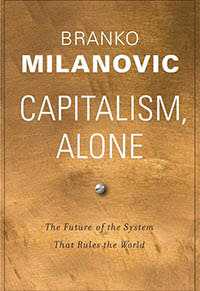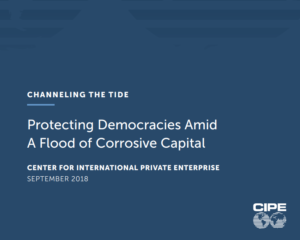 China’s economic success undermines the West’s claim that there is a necessary link between capitalism and liberal democracy, argues Branko Milanovic, a Senior Scholar at the Stone Center on Socio-Economic Inequality at the CUNY Graduate Center and author of Capitalism, Alone. As China expands its role on the international stage, its form of capitalism is invariably coming into conflict with the liberal meritocratic capitalism of the West. Political capitalism might supplant the Western model in many countries around the world, he writes for Foreign Affairs:
China’s economic success undermines the West’s claim that there is a necessary link between capitalism and liberal democracy, argues Branko Milanovic, a Senior Scholar at the Stone Center on Socio-Economic Inequality at the CUNY Graduate Center and author of Capitalism, Alone. As China expands its role on the international stage, its form of capitalism is invariably coming into conflict with the liberal meritocratic capitalism of the West. Political capitalism might supplant the Western model in many countries around the world, he writes for Foreign Affairs:
The advantage of liberal capitalism resides in its political system of democracy. Democracy is desirable in itself, of course, but it also has an instrumental advantage. By requiring constant consultation of the population, democracy provides a powerful corrective to economic and social trends that may be detrimental to the common good. Even if people’s decisions sometimes result in policies that reduce the rate of economic growth, increase pollution, or lower life expectancy, democratic decision-making should correct such developments. RTWT
 Capital flows and foreign assistance loans with little accountability have significant potential to exacerbate corruption and widen governance gaps in Southeast Asia. These capital flows – including official development aid, economic assistance, loans, foreign direct investment, and portfolio investment – pose a risk for nations with weak governance and fragile institutions, the 2019 Center for International Private Enterprise observes.
Capital flows and foreign assistance loans with little accountability have significant potential to exacerbate corruption and widen governance gaps in Southeast Asia. These capital flows – including official development aid, economic assistance, loans, foreign direct investment, and portfolio investment – pose a risk for nations with weak governance and fragile institutions, the 2019 Center for International Private Enterprise observes.
These flows are nevertheless essential to the region’s growth and to alleviating the tremendous infrastructure investment gap required to bring equitable, sustainable improvements to the livelihoods of Southeast Asian citizens. But China’s corrosive capital, which makes up an increasingly large portion of the flows into Southeast Asia, poses particular risks due to lack of transparency and accountability and the frequent use of non-inclusive procurement processes, according to CIPE, a core institute of the National Endowment for Democracy (NED).







